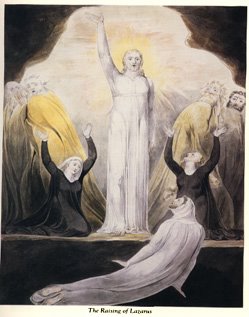The Catholic Church has, for many in the West, lost its position as a moral authority. Whether that's right or wrong is a matter of dispute, but it is the objective reality in the West. It leaves a moral vacuum. Worse, it leaves a hatred in the collective mind of the very idea of an organised moral institution. The Protestant Reformation arose from that revulsion the Catholic Church brought upon itself and the world. Unfortunately, Protestantism isn't much better than the Catholic Church, in the eyes of many. The very idea of religion at all, and of God, is a source of hatred for many. For the past 250 years science has provided some kind of stop-gap as an authority, if amoral, but it too is discredited. We are left standing as the children of Sawney Beane, the ignorant children of a cannibal who has raised us to look upon the world as empty of meaning, as people as things to be eaten. We are the vacuous creatures of consumerism. We are assailed by Islam, a vigorous and primitive force of reaction and fascism; and Islam is aided and abetted by those among us who are atheists in a sense so deep that the world has never before experienced anything so despairing: people in the West generally have not anything at all to believe in but MTV.
The argument is that there is no authority to base our beliefs on. We ask an empty universe for answers to our moral questions, and in return we receive radio static and x-rays. It will not do. We ask each other, and we receive nothing better than one man's opinion, he possibly being Sawney Beane. The echoes from the cave of morality discourage.
Some of our more repulsively stupid fellows, usually our intelligentsia, feel that there is no universal truth, that there is only contingent truth, relative morality, and finally, that there is only astrology or tarot cards to base our morals judgements on. Some go so far as to opine that there is no such thing as truth at all, it being a social construct-- usually described as concocted by the dominant class in support of its own power, we being dupes who believe in phantasy that tricks us into acting against our own interests. The idea is originally Platonic, Plato being, as Neil Postman writes, "the first systematic fascist." That "narrative" is the dominant one in the West today. It leaves us in a state of moral stupor. I argue that the current Left dhimmi fascist moral narrative is as corrupt and disgusting as anything the Catholic Church is accused of. I argue that we today are in a state of public moral ruin. We cannot fight Islam if we do not care at all for our own lives. If we have no meaning as people, if our lives are no more worthwhile than the lives of chickens and Amazonian rain forests, then we are doomed to die out and to be overrun by Islam. Many in the West feel that that would be a good thing, the end of our revolutions of Modernity. Those who so argue are fascists. They are my enemies. What do we fight them with? What authority do we claim that proves us right in our struggle to further our revolutions?
We have written here many times on Georges Sorel and the Myth of the General Strike. Sorel is right, in our opinion, that the Myth is essential rather than the kind of myth it might be. We require a reformation of our social and therefore universal myth if we are to not only survive but triumph. I intend to win. To win, to survive at all, we must reform our Myth of what it is to be moral.
Math is a metaphor. Language is a metaphor. So too are Time, Money, Colour, Shape, Extension, and so on. And yet, Human myths, metaphors though those concepts are, they are also Human realities, and they are universal. So too must be our reformed Morality. But it must also be authoritative.

Where do we begin? I begin with the story of Lazarus from the Book of John, 11: 39-44, perhaps surprising for one self-proclaimed atheist:
39 Jesus said, Take ye away the stone. Martha, the sister of him that was dead, saith unto him, Lord, by this time he stinketh: for he hath been dead four days.
40 Jesus saith unto her, Said I not unto thee, that, if thou wouldest believe, thou shouldest see the glory of God?
41 Then they took away the stone from the place where the dead was laid. And Jesus lifted up his eyes, and said, Father, I thank thee that thou hast heard me.
42 And I knew that thou hearest me always: but because of the people which stand by I said it, that they may believe that thou hast sent me.
43 And when he thus had spoken, he cried with a loud voice, Lazarus, come forth.
44 And he that was dead came forth, bound hand and foot with graveclothes: and his face was bound about with a napkin. Jesus saith unto them, Loose him, and let him go.
The verses above distinguish clearly the problem of the Moral from that of the ethical. The ethical hardly interests me, it being a matter of how to act like a decent person. I don't much care. It is the Moral that is of concern. Look at Lazarus arisen. His ethical behavior is not important to the story of his reliving. The moral of his new lease on life is what is.
Suppose, if you will, that Lazarus is a smelly and creepy guy who has no job, hangs out in the market place and gropes women, and shop lifts. He might be unethical, but to Jesus that is not important. What is? Jesus could have raised up Brad Pitt or Clark Gable. He did not do so. He chose a guy who wasn't special. He did not pick a man who had qualities the world missed and wanted back for however long the life could last. He chose a guy off the street. Ordinary nobody guy is as important as Brad Pitt for some reason. Why him?
Lazarus, if no one else, must have wondered. And perhaps Lazarus was pleased. But Lazarus must also have been anguished: What was he supposed to do now that he found himself alive again after being so comfortably dead already? He found himself back on the street, in need of the things one requires to keep body and soul together. He had to return to shoplifting and girl groping and smelling bad. His ethical problems pale in the light of what the moral of his story is. Having returned to life, what was the meaning of it? What was he supposed to live? Forget what he was supposed to do, that's obvious: he had to live. But why? Was he supposed to live because the city ran out of shoplifters and gropers who smell bad? Not likely. So what is the purpose of his life? He has it again, and aside from making a living, what is he supposed to be? What isn't trivial? And what is important? What is so important that it makes his new life worth the effort of having raised him up from the dead? Watching MTV isn't likely what Jesus had in mind for him. Being thankful and acting as Jesus's servant isn't likely either because it's not something he would have done had he been allowed to die in peace. No one would like to live again only to do something in the new life he wouldn't have felt right about in the old. Lazarus, I believe, was free to choose his own destiny-- if he could understand what it was. A clean slate. A chance to do anything at all from the beginning. What would he choose? What could be important?
That, according to me, would be the Moral. Not the what but the why. The moral would be as mythical and as real a metaphor as math and time and money.
I argue that we in the West have generally lost the authoritative moral that tells us Why. Our metaphor of Why is as corrupt as the Catholic Church in the Renaissance. We have no legitimate metaphor and no authority we can believe in. We are as lost and helpless as the children of Sawney Beane. Our moral authority could as easily be a cannibal living in a cave. How do we know if he's right or wrong, and if we hear from others, from even so many as all others, how do we know they are right? Everyone could easily be wrong about the moral, as wrong as Sawney Beane. And how would we know? Where do we turn for the answer of true authority? We turn, I suggest, to the metaphor of morality that is as solid as the metaphor of math and as universal.
We in the West do not have an agreed upon universal moral based on true authority. Without that we are like Lazarus standing in the dust wondering what to do next.

Every morning when we awake we are like Lazarus arisen from death: we are alive again and faced with what we live for. What do we live that isn't more of the same trivia? If it's more of the same trivia then why do we live at all rather than not? If it's the same trivia, we would have been better off being dead so as not to have to suffer more of it. Reliving would be no good thing. We wouldn't thank anyone for that. And yet we do wake each morning to face a new day of life. I think we in the West find that harder to do daily. I think Islam triumphs because we have lost our moral.
In coming posts we'll look at the return to irrationality as pseudo-religion and see how it fits into the pattern of Left dhimmi fascism that we go on about at such length here.



3 comments:
Wow.
I myself, an agnostic Jew, have been completely rethinking Christianity since 9-11.
What that bastard Muchmut Atta did for me was erase my pc fantasies of convivienca in Muslim Spain and begin me on a true understanding of what the difference between a religion founded by Rabbis and that founded by a warrior who gave pet names like "sinks-easily-into-flesh" to his favorite weapons.
I like trivial days of awakening.
Like you, I have grown to respect my long neglected Christianity as I have learned to hate Islam. They are truly opposing viewpoints of the world and the freedom of man.
Dag says, "We have no legitimate metaphor and no authority we can believe in. We are as lost and helpless as the children of Sawney Beane."
Is it that there is no authority people can believe in or is it that people refuse to believe?
As Paul says in his first letter to the church in Corinth: "For the word of the cross is to those who are perishing foolishness, but to us who are being saved it is the power of God ... For indeed Jews ask for signs and Greeks search for wisdom, but we preach Christ crucified, to Jews a stumbling block and to Gentiles foolishness."
In the coming judgment of God I believe that the church will have to answer much for how it has behaved throughout history. But because men have been faithless in the way they have behaved does not mean that God is not true and that the Bible is not true.
It just means that we continue to prove what God has told us - that we are broken and in need of a Savior.
Post a Comment